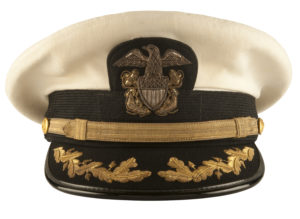
Here’s what he writes about it:
“Love as unselfishness never seeks its own to the harm or disadvantage of others, or with the neglect of others. It often neglects its own for the sake of others; it prefers their welfare, satisfaction, and advantage to its own; and it ever prefers good of the community to its private advantage. It would not advance, aggrandize, enrich, or gratify itself at the cost and damage of the public.”
I interpret Drummond’s definition of unselfishness in many ways as being related to humility. It’s all about moving from a focus on yourself to concern about helping others. This is really a journey in life. How many of you have ever known a baby who came home from the hospital asking “How can I help around the house?” No, they’re screaming for what they want! Humans are naturally selfish beings. Being unselfish is a learned behavior.
My father modeled unselfishness for me when I was very young. He graduated from the United States Naval Academy in 1924. Since World War I had ended and people thought that was the war to end all wars, the Navy didn’t think they needed as many officers at that time. As a result, my father was released after his senior cruise. In January 1925 he entered Harvard Business School with a major in finance and then headed to Wall Street to begin his career.
In 1940, when I was one year old, he was about to be made a vice president of National City Bank. Instead, he came home and said to my mother, “I quit my job today.”
My mother said, “To do what?”
“I rejoined the Navy.”
“You’ve got to be kidding me!”
My father responded, “Remember when we got married, I said that if the country ever got in trouble, I owed it something. Hitler is crazy and pretty soon the Japanese will be in this war.”
So my father went from being a potential bank vice president to a second lieutenant at the Brooklyn Navy Yard. When Pearl Harbor happened in December 1941, it looked like he was going to stay there because he was 40 years old with no naval experience. But that wasn’t my father’s style—so he called one of his classmates from the Academy who was a top person at the Bureau of Naval Personnel in Washington and said, “What do you have for an old fart with no experience? I’ve got to get in the action.”
His buddy said, “Let me see what I can find and I’ll get back to you.” A few days later he called my dad and said, “All I have for a guy with your experience is heading up a suicide group going into the Marshall Islands.”
My dad immediately said “You’ve got your man!” Of course, he didn’t tell my mother what his friend had said. He was given the command of twelve LCI (Landing Craft, Infantry) leading the first wave into the Marshall Islands. Well over half of his men were killed or wounded. I have a picture of me at five years old in a sailor suit saluting him as he got off the train, returning home after being away for more than two years.
All this to say my dad was the most unselfish person I have ever met. How about you? Who models or has modeled unselfishness for you in your life? Remember—just because we were all born selfish doesn’t mean we can’t master unselfish behavior as adults!